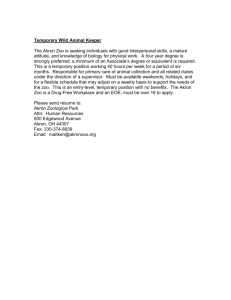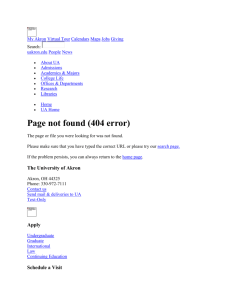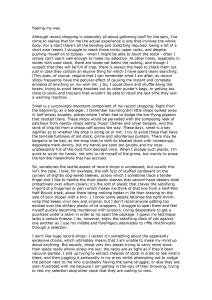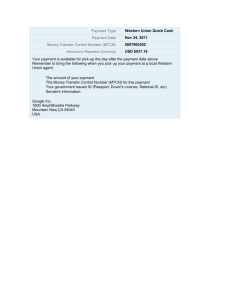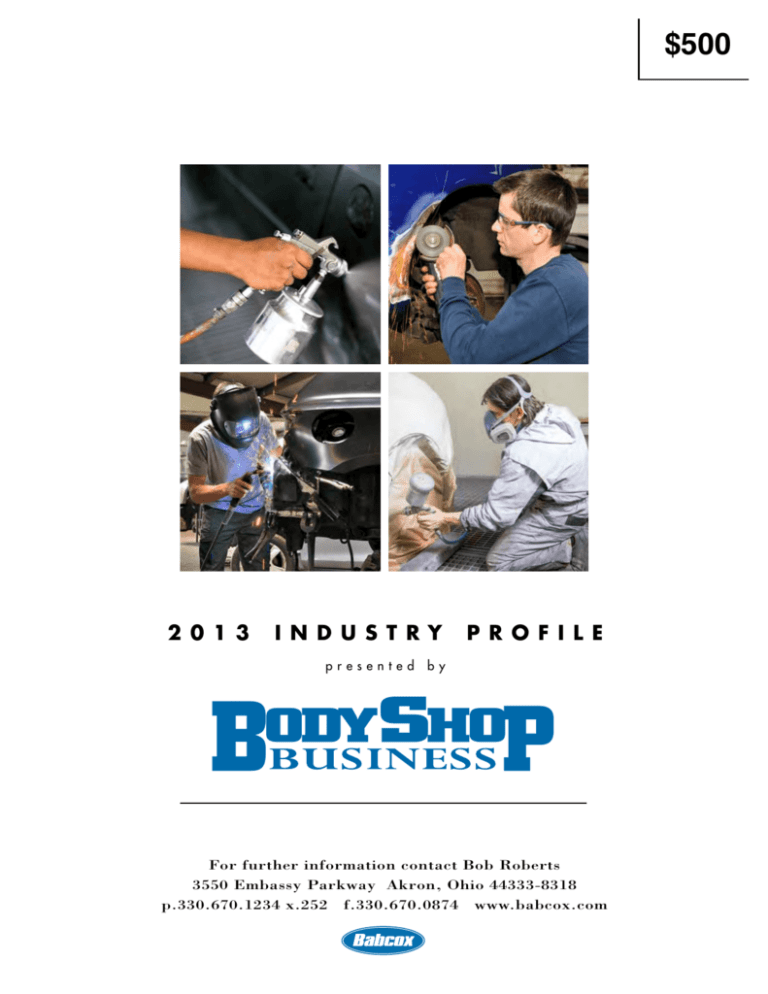
$500
2 0 1 3
I N D U S T R Y
presented
P R O F I L E
by
For further information contact Bob Roberts
3550 Embassy Parkway Akron, Ohio 44333-8318
p.330.670.1234 x.252 f.330.670.0874 www.babcox.com
2013 BodyShop Business Industry Profile
2013 INDUSTRY PROFILE
INTRODUCTION
The 2013 Body Shop Industry Profile is the most recent in a series of annual surveys covering the
automotive body repair market. The respondents are owners and managers of body shops selected
from the circulation list of BodyShop Business magazine. A random selection process was used to
identify the target locations.
The information contained in this report provides valuable trend data as well as answers to more
topical issues confronting the industry. It is perhaps the most comprehensive study of the opinions
and operating variables of the day-to-day decision-makers that make up this industry.
It should be noted that the vast majority of the respondents are either owners/partners or shop
managers of their respective operations.
The 2013 Body Shop Industry Profile is separated into six sections:
Section 1
Respondent Profile
Section 2
General Business Operations
Section 3
Employee Profile
Section 4
Purchasing & Equipment Profile
Section 5
Sales Analysis & Operations
Section 6
Direct Repair Programs and Insurer Issues
Questions about this report can be directed to Bob Roberts at the address listed below.
Prepared by Babcox Research: A Division of Babcox Media, 3550 Embassy Parkway, Akron, OH 44333.
Copyright © 2013. All rights reserved. Reproduction in any form without written permission is prohibited.
2013 BodyShop Business Industry Profile
2013 INDUSTRY PROFILE
METHOD
The Body Shop Industry Profile is a comprehensive overview of the collision repair industry. It
provides unique insight into the collision repair industry. The articles and product information that
appear in the pages of BodyShop Business are thus based on the most up-to-date information
available and provide the most useful data to body shops, manufacturers, distributors and other
parties interested in the growth and development associated with the collision repair industry.
The 2013 Body Shop Industry Profile was executed via a nationwide email survey to collision repair
shops. The survey consisted of 6 questionnaires. Each questionnaire was e-mailed to a sample of
readers of BodyShop Business. Each questionnaire contained unique questions and there were a
number of questions that were common to all questionnaires. A seventh questionnaire dealt just
with grading insurance companies. The method of sample selection, data collection, and tabulation
were the same across all versions.
The survey was conducted in March, 2013. Responses were received from over 500 shops.
Sample selection entailed a systematic sampling procedure in which every ‘nth’ name was selected
from the subscription list. The sample provided random geographic representation.
NOTE: The process of sending the questionnaires by email has created a break with data collected
in previous surveys done by mail. Shops who respond to email surveys tend to be bigger than those
who respond to random mailed (postal) surveys. Consequently, many of the results of this year’s
survey are not directly comparable with those done by mail. Our responding shops are larger, with
higher sales & more people, and they write more estimates and perform more jobs per month.
Prepared by Babcox Research: A Division of Babcox Media, 3550 Embassy Parkway, Akron, OH 44333.
Copyright © 2013. All rights reserved. Reproduction in any form without written permission is prohibited.
2013 BodyShop Business Industry Profile
2013 INDUSTRY PROFILE
TABLE OF CONTENTS
Page
Number
Item
Section One: Shop Owner Profile
Business Description
2
Respondent’s Age
3
Family-Owned Body Shops
3
Multiple Shop Ownership
4
Perceptions of Financial Strength (current and future)
4
If You Could Start Over
5
Trade Show Attendance
5
Respondent’s Position
6
Major Challenge
6
Section Two: General Business Operations
Number of Years Shop Has Been in Business
8
Advertising Methods
9
Advertising Expenditures
9
Advertising Effectiveness
10
Sources of Business
10
Section Three: Employee Profile
Number of Employees
12
Changes in Work Force Size
13
Hiring
14
Training Seminar Attendance
14
ASE Certification
15
Training
15
Compensation Methods
16
Pay Scales for Technicians
17
Pay Scales for Entry-Level Employees
18
Employee Benefits
18
Sources for Hiring Personnel
19
Prepared by Babcox Research: A Division of Babcox Media, 3550 Embassy Parkway, Akron, OH 44333.
Copyright © 2013. All rights reserved. Reproduction in any form without written permission is prohibited.
2013 BodyShop Business Industry Profile
TABLE OF CONTENTS (Continued)
Item
Page
Number
Section Four Purchasing and Equipment Profile
How Owners Find Out About New Products
Criteria Influencing Paint Buying Decisions
What Buying Dollars Are Spent On
Percentage of Shops Purchasing Aftermarket Crash Parts
Acceptable Fit of Crash Parts
Mechanical Parts
Ranking Attributes When Selecting Parts Vendor
Percentage of Repair Orders Using These Parts
Number of Paint Brands Used
Median Amount Spent Monthly on Various Items
Number of Pulling/Measuring Equipment Brands Used
Percentage of Time These Repair Procedures are Used
Estimating Systems
Ownership Of Types of Equipment
21
21
22
23
24
24
25
25
26
26
27
27
27
28
Section Five Sales Analysis and Operations
2012 Sales Volume
Percent of Gross Sales Attributed to Parts and Labor
Comparison of Sales 2012 to 2011
Anticipated Future Sales Comparison 2013 to 2012
2012 Gross Profit Margins
2012 Profit Margin Compared to 2009 Profit Margin
Number of Estimates Written Weekly
Percentage of Estimates Converted to Jobs
Cycle Time
Written Procedures
Number of Jobs Performed per Week
Average Ticket per Job
Mechanical Parts
Breakdown of Labor Dollars
Posted Labor Rates
Storage Rate
Do You Charge for These Procedures
Doing Restoration
30
30
31
31
32
32
32
33
33
33
34
35
35
35
36
37
37
37
Prepared by Babcox Research: A Division of Babcox Media, 3550 Embassy Parkway, Akron, OH 44333.
Copyright © 2013. All rights reserved. Reproduction in any form without written permission is prohibited.
2013 BodyShop Business Industry Profile
TABLE OF CONTENTS (Continued)
Page
Number
Item
Section Six: Direct Repair Programs and Insurer Issues
DRP Arrangements
39
Better Off as a DRP
39
DRP and Profit Margins
40
Concessions
40
OEM and Aftermarket Parts
41
Being Told “You are the only one who charges for that”
41
Times Reduced by Insurers
42
Ever Altered a DRP Contract
42
Is DRP Good or Bad for the Industry
43
Do DRPs Hamper Your Ability to Properly Repair a Vehicle
43
Educating the Customer
44
Customer “Steering”
44
Insurers’ Surveys of Labor Rates
44
Charging Regular Rate Increases
44
Negotiations With Appraisers
45
Consumer Self-Pay
46
Do Insurers Pay the Frame and Mechanical Rates
46
Are Times Allowed Accurate
46
Supplements
47
Thresholds, Discounts, Markups
47
Rating Insurance Companies on Nine Attributes
48
Prepared by Babcox Research: A Division of Babcox Media, 3550 Embassy Parkway, Akron, OH 44333.
Copyright © 2013. All rights reserved. Reproduction in any form without written permission is prohibited.
2013 BodyShop Business Industry Profile
2013 INDUSTRY PROFILE
SECTION ONE
RESPONDENT PROFILE
HIGHLIGHTS
Business type:
The overwhelming majority of our respondents operate independent body shops.
Respondent age:
Sixty percent of our respondents are between 50-64 years of age.
Shop ownership:
Approximately 86% of shops are family owned.
Perceptions:
Forty-four percent of the respondents feel the shop is financially better off now
than 5 years ago, but 58% think it will be more successful in the next 5 years.
CONTENTS
Item
Page
Number
Business Description
2
Respondent’s Age
3
Family-Owned Body Shops
3
Multiple Shop Organizations
4
Perceptions of Financial Strength (current & future)
4
If You Could Start Over
5
Trade Show Attendance
5
Respondent’s Position
6
Major Challenge
6
Prepared by Babcox Research: A Division of Babcox Media, 3550 Embassy Parkway, Akron, OH 44333.
Copyright © 2013. All rights reserved. Reproduction in any form without written permission is prohibited.
1
2013 BodyShop Business Industry Profile
Which of the following best describes your business?
HOW TO USE THIS REPORT
This report is divided into six sections. Each section begins with a HIGHLIGHTS review. The Highlights review
is a summary that gives the reader important information at a glance. The majority of information contained in this
report is shown in the form of charts and graphs, which make the vast amount of data more readable.
Some of the information contained herein is contained in the May, 2013 issue of BodyShop Business magazine.
Interpreting the data:
Much of the data appear as averages. It is important to understand that there is no such entity as an 'average' body shop.
These numbers represent the combined responses of shop operators from across the United States. The averages are
affected by a number of large shops with large numbers of bays, many employees and high sales figures. For this reason,
many results are shown broken out by five categories of annual sales.
Prepared by Babcox Research: A Division of Babcox Media, 3550 Embassy Parkway, Akron, OH 44333.
Copyright © 2013. All rights reserved. Reproduction in any form without written permission is prohibited.
2
2013 BodyShop Business Industry Profile
How old are you?
Is this business family owned?
The vast majority of collision repair shops contacted are family owned.
Prepared by Babcox Research: A Division of Babcox Media, 3550 Embassy Parkway, Akron, OH 44333.
Copyright © 2013. All rights reserved. Reproduction in any form without written permission is prohibited.
3
2013 BodyShop Business Industry Profile
How many shops are in your organization?
About 18% of respondents are part of a larger organization.
Do you think your business is financially better off than it was five years ago?
Prepared by Babcox Research: A Division of Babcox Media, 3550 Embassy Parkway, Akron, OH 44333.
Copyright © 2013. All rights reserved. Reproduction in any form without written permission is prohibited.
4
2013 BodyShop Business Industry Profile
In the next five years, do you think your business will be more successful than it is today?
If you could start over would you still decide to work in the collision repair industry?
Yes 61%
No 39%
Did you or anyone at your shop attend any trade shows in 2012?
Yes 33%
No 67%
Please indicate if you attended the following trade shows in 2012 or plan to in 2013:
Attended
in 2012
Plan to in
2013
Neither
Local/Regional show
30%
29%
64%
NACE
12%
24%
73%
SEMA
11%
28%
72%
Show
A number of respondents left this question blank suggesting that that the actual percentages could be lower.
Prepared by Babcox Research: A Division of Babcox Media, 3550 Embassy Parkway, Akron, OH 44333.
Copyright © 2013. All rights reserved. Reproduction in any form without written permission is prohibited.
5
2013 BodyShop Business Industry Profile
What is your position?
Position
Percentage of
Respondents
Owner/partner
62%
Technician/painter
26%
Shop foreman
5%
Shop manager
2%
Other
5%
Total
100%
What is the major challenge your business will face in the next 12 months?
These answers were collected as verbatim “fill in the blank” responses and ran through a wide variety
of issues. The most common response was a lack of volume due to the economy or a perceived effect from insurance
company steering. Some shops wanted to get on DRP arrangements to increase work volume. Most comments seemed
to reveal frustration in general and low profit levels – many centering on insurance companies.
A few of the comments are shown below:
Attracting more customers to our front door and adding more DRP's.
The state of the economy
Total losses and absorbing repair costs needs that insurance companies don't want to pay for a proper repair, but we do
it anyway for our integrity. We need to start charging customers over and above the deductible for what the companies
don't want to pay.
Absorbing higher costs example: health insurance for employees
Getting city to approve our building plans
DRPs & making a profit
Staying up with new technology and the equipment needed to repair the new vehicles
Prepared by Babcox Research: A Division of Babcox Media, 3550 Embassy Parkway, Akron, OH 44333.
Copyright © 2013. All rights reserved. Reproduction in any form without written permission is prohibited.
6
2013 BodyShop Business Industry Profile
2013 INDUSTRY PROFILE
SECTION TWO
GENERAL BUSINESS OPERATIONS
HIGHLIGHTS
Age of Business:
The typical shop has been in business over 31 years.
Advertising &
Promotion:
Word of mouth and internet websites are the most common forms of promotion.
Sources of Business: The biggest source for a DRP is direct repair programs.
For non-DRPs it is word-of-mouth.
CONTENTS
Item
Page
Number
Number of Years Shop Has Been in Business
8
Advertising Methods
9
Advertising Expenditures
9
Advertising Effectiveness
10
Sources of Business
10
Prepared by Babcox Research: A Division of Babcox Media, 3550 Embassy Parkway, Akron, OH 44333.
Copyright © 2013. All rights reserved. Reproduction in any form without written permission is prohibited.
7
2013 BodyShop Business Industry Profile
How many years has your shop been in business?
Number of Years Shop Has Been in Business
30%
27%
25%
23%
Percentage of Shops
20%
20%
14%
15%
13%
10%
5%
3%
0%
Up to 5 years
6-10 years
11-20 years
21-30 years
31-40 years
Over 40 years
The typical shop has been in business over 31 years.
The following chart shows the results over a period of time.
Prepared by Babcox Research: A Division of Babcox Media, 3550 Embassy Parkway, Akron, OH 44333.
Copyright © 2013. All rights reserved. Reproduction in any form without written permission is prohibited.
8
2013 BodyShop Business Industry Profile
How do you market your services?
About 44% of shops place yellow page advertising, about 34% place radio spots and 19% utilize television.
How much do you spend per year on advertising?
The average is $16,031 & the median is $5,000. This suggests a wide range of answers.
Some respondents left this question blank.
Prepared by Babcox Research: A Division of Babcox Media, 3550 Embassy Parkway, Akron, OH 44333.
Copyright © 2013. All rights reserved. Reproduction in any form without written permission is prohibited.
9
2013 BodyShop Business Industry Profile
Please rank the effectiveness of the following forms of advertising you have tried:
How much business is generated from each source?
Business Source
Typical DRP Shop
Non-DRP Shop
Direct repair programs
43.4%
0%
Word-of-mouth
27.3%
60.2%
Insurance referral
8.7%
12.7%
Car dealer
8.7%
11.8%
Advertising/direct sales efforts
7.7%
9.3%
Fleets
2.9%
2.9%
Other
1.3%
3.2%
100%
100%
Total
Prepared by Babcox Research: A Division of Babcox Media, 3550 Embassy Parkway, Akron, OH 44333.
Copyright © 2013. All rights reserved. Reproduction in any form without written permission is prohibited.
10
2013 BodyShop Business Industry Profile
2013 INDUSTRY PROFILE
SECTION THREE
EMPLOYEE PROFILE
HIGHLIGHTS
Employees:
The typical shop has an average of 8.8 employees, a median of 7.
Changes in
Work force:
About 45% of shops saw a change in the number of production employees in 2012.
About 27% of respondents expect to hire additional help in the next 12 months.
Training:
Eighty-four percent of shops had at least one employee attend a training session in 2012.
ASE certification:
About 56% of shops have at least one ASE certified employee.
Employee
Compensation:
The most common form of compensation is hourly wage.
Sources of new
Employees:
The most common method of finding new employees is through referral from
current employees.
CONTENTS
Item
Page
Number
Number of Employees
12
Changes in Work Force Size
13
Hiring
14
Training Seminar Attendance
14
ASE Certification
15
Training
15
Compensation Methods
16
Pay Scales for Technicians
17
Pay Scales for Entry-level Employees
18
Employee Benefits
18
Sources for Hiring Personnel
19
Prepared by Babcox Research: A Division of Babcox Media, 3550 Embassy Parkway, Akron, OH 44333.
Copyright © 2013. All rights reserved. Reproduction in any form without written permission is prohibited.
11
2013 BodyShop Business Industry Profile
Including yourself, how many employees work at this shop?
The average is 8.8 employees; the median is 7 employees.
Average number of employees by sales volume:
Number of
employees
Up to
$249,999
$250,000$349,999
$350,000$749,999
$750,000$1 million
$1 million$2 million
Over
$2 million
3.3
4.0
5.9
7.7
10.6
24.6
Not surprisingly, the larger shops have more employees.
What is the average age of your production shop personnel?
The average is 40 years
Prepared by Babcox Research: A Division of Babcox Media, 3550 Embassy Parkway, Akron, OH 44333.
Copyright © 2013. All rights reserved. Reproduction in any form without written permission is prohibited.
12
2013 BodyShop Business Industry Profile
The following chart shows a time series of number of employees. The number has moved in a narrow range.
.
In the past 12 months has the size of your production workforce increased…decreased?
Prepared by Babcox Research: A Division of Babcox Media, 3550 Embassy Parkway, Akron, OH 44333.
Copyright © 2013. All rights reserved. Reproduction in any form without written permission is prohibited.
13
2013 BodyShop Business Industry Profile
If you could hire another true “A-tech/journeyman tech” would you?
Yes 64%
No 36%
If you could hire another experienced painter, would you?
Yes 38%
No 62%
Both these values have a higher “yes” percentage than in the last report.
What do you expect will happen to the size of your workforce in the next year?
Have you or any of your employees attended a training session in the past year?
Yes 84%
Type of Session
Jobber clinic
I-CAR training
Waterborne
Manufacturer training
ASE
Association seminar
Other
No 16%
Percent
58%
56%
52%
34%
33%
16%
8%
Prepared by Babcox Research: A Division of Babcox Media, 3550 Embassy Parkway, Akron, OH 44333.
Copyright © 2013. All rights reserved. Reproduction in any form without written permission is prohibited.
14
2013 BodyShop Business Industry Profile
Are any of your shop technicians ASE certified?
Do you have a system within your shop to train entry-level production employees?
Yes 60%
No 40%
How long does it take your shop to train a new hire to be a:
“B” level technician: 11.8 months
“A” level technician: 21.8 months
Painter: 16.9 months
Prepared by Babcox Research: A Division of Babcox Media, 3550 Embassy Parkway, Akron, OH 44333.
Copyright © 2013. All rights reserved. Reproduction in any form without written permission is prohibited.
15
2013 BodyShop Business Industry Profile
How do you compensate your production shop personnel?
The total adds to more than 100%. There may be different methods for each employee,
or one person might receive a blend of compensation methods.
There is obviously a wide range of pay options and combinations throughout the industry.
Prepared by Babcox Research: A Division of Babcox Media, 3550 Embassy Parkway, Akron, OH 44333.
Copyright © 2013. All rights reserved. Reproduction in any form without written permission is prohibited.
16
2013 BodyShop Business Industry Profile
On average, what do your technicians (journeymen) make per year? Categories:
Mechanic
Metal tech
Painter
Painters remain typically the highest paid personnel in the shop.
To read the chart: 24% of shops say their
average pay for painters is in the range of
$41,001-$50,000.
Prepared by Babcox Research: A Division of Babcox Media, 3550 Embassy Parkway, Akron, OH 44333.
Copyright © 2013. All rights reserved. Reproduction in any form without written permission is prohibited.
17
2013 BodyShop Business Industry Profile
Average Pay for Metal Techs by Shop Sales:
Average Pay
Up to
$249,999
$250,000$349,999
$350,000$749,999
$750,000$1 million
$1 million$2 million
Over
$2 million
$35,338
$43,621
$48,877
$55,770
$57,715
$66,570
The table above shows average pay for journeymen metal technicians by shop sales.
Larger shops tend to pay more. Some might be more efficient, giving the employee more billable hours.
On average, what do you pay entry-level painters/technicians?
Median $30,000
What do you pay your office manager per year?
Median $40,000
What do you pay your senior estimator per year?
Median $48,500
Are you experiencing challenges in finding front office help? (CSRs, estimators, etc.)
Yes 36%
No 64%
Yes 93%
No 7%
Do you offer employee benefits?
The percentage offering benefits was 67% in the 2011 study.
Prepared by Babcox Research: A Division of Babcox Media, 3550 Embassy Parkway, Akron, OH 44333.
Copyright © 2013. All rights reserved. Reproduction in any form without written permission is prohibited.
18
2013 BodyShop Business Industry Profile
Please check all benefits that apply:
What is the #1 source you use to hire production personnel for your shop?
Most Helpful
Source
Source
Employee referral
Internet
Newspaper ad
Other shops
Other*
44%
21%
12%
6%
17%
Total
100%
* “Other” are largely vendor referrals and tech centers
Prepared by Babcox Research: A Division of Babcox Media, 3550 Embassy Parkway, Akron, OH 44333.
Copyright © 2013. All rights reserved. Reproduction in any form without written permission is prohibited.
19
2013 BodyShop Business Industry Profile
2013 INDUSTRY PROFILE
SECTION FOUR
PURCHASING AND EQUIPMENT PROFILE
HIGHLIGHTS
Sources of Information: Trade magazines are the most popular sources of information on new products.
Crash parts:
The typical shop spends 37% of its buying dollars on crash parts.
Nearly all (94%) of shops purchase aftermarket crash parts.
Paint:
‘Quality’ is the most important purchase factor for paint.
The median amount spent on paint per month is $3,000.
Over 70% of respondents use only one brand of paint.
Measuring/
Pulling equipment:
Parts replacement:
About 35% of the shops use more than one brand of measuring/pulling equipment
When making collision repairs, shops replace with new OEM parts 43% of the time, repair the
damaged part about 25% of the time, or replace with either aftermarket (19%) or used (13%).
Equipment ownership: The percentage of shops currently owning or intending to purchase
19 types of shop equipment is shown on page 28.
CONTENTS
Item
Page
Number
How Owners Find Out About New Products
21
Criteria Influencing Paint Buying Decisions
21
What Buying Dollars Are Spent On
22
Percentage of Shops Purchasing Aftermarket Crash Parts
23
Acceptable Fit of Crash Parts
24
Mechanical Parts
24
Ranking Attributes When Selecting a Parts Vendor
25
Percentage of Repair Orders Using These Parts
25
Number of Different Paint Brands Used Regularly
26
Median Amount Spent on These Items Monthly
26
Number of Pulling/Measuring Equipment Brands Used
27
Percentage of Time These Repair Procedures are Used
27
Estimating Systems
27
Ownership of Types of Equipment
28
Prepared by Babcox Research: A Division of Babcox Media, 3550 Embassy Parkway, Akron, OH 44333.
Copyright © 2013. All rights reserved. Reproduction in any form without written permission is prohibited.
20
2013 BodyShop Business Industry Profile
How do you find out about new products? (please rank each of the following from 1 to 5)
Trade magazines are the most helpful media in introducing new products followed by jobbers
and manufacturer’s reps. (note that the shorter the bar, the more helpful the source).
Please rank the following according to influence when making paint purchases:
Quality ranks as the most important
influence when shops make their
buying decisions.
Prepared by Babcox Research: A Division of Babcox Media, 3550 Embassy Parkway, Akron, OH 44333.
Copyright © 2013. All rights reserved. Reproduction in any form without written permission is prohibited.
21
2013 BodyShop Business Industry Profile
Factors influencing the paint buying decision:
RATING
Attribute
1
2
3
4
5
6
7
Quality
71%
22%
2%
3%
2%
0%
0%
Reputation of product
52%
28%
10%
7%
0%
2%
2%
Ease of application
38%
38%
13%
7%
2%
0%
3%
37%
21%
5%
7%
2%
4%
25%
32%
18%
8%
10%
7%
7%
18%
Price
30%
14%
16%
14%
6%
6%
13%
Painter’s
recommendation
30%
13%
15%
15%
7%
7%
13%
Best waterborne
system
Deal or contract
w/paint company
Seventy-one percent of respondents give “quality” a rating of “1” in importance.
What percentage of your buying dollar is spent on…?
Shops spend about 37% of total dollars on crash parts.
They typically have “other” expenses equal to about 6% of total expense.
Prepared by Babcox Research: A Division of Babcox Media, 3550 Embassy Parkway, Akron, OH 44333.
Copyright © 2013. All rights reserved. Reproduction in any form without written permission is prohibited.
22
2013 BodyShop Business Industry Profile
Do you purchase aftermarket crash parts?
Yes 94%
No
6%
Overall, about 94% of shops purchase aftermarket crash parts.
If yes, why do you purchase aftermarket crash parts?
The majority of shops which purchase aftermarket crash parts do so because they feel
pressure from the insurance company. “Other” are typically insurance issues as well.
Prepared by Babcox Research: A Division of Babcox Media, 3550 Embassy Parkway, Akron, OH 44333.
Copyright © 2013. All rights reserved. Reproduction in any form without written permission is prohibited.
23
2013 BodyShop Business Industry Profile
Based on experience, what percentage of replacement crash parts that you try to install provides an acceptable fit?
Aftermarket parts have a reputation as being less likely to fit than OEM parts.
Do insurance companies assert any influence when you purchase mechanical parts?
Yes 48%
No
52%
The ‘yes” value was 30% in the 2011 survey.
Are you in favor of insurer-related parts procurement programs?
Yes 9%
No
91%
What percentage of the following collision parts do you return to the vendor?
Type of Part_
Average
Percent
Returned
OEM parts
5%
Certified aftermarket parts
23%
Non-certified aftermarket parts
31%
Original equipment parts remain less likely to be returned.
Prepared by Babcox Research: A Division of Babcox Media, 3550 Embassy Parkway, Akron, OH 44333.
Copyright © 2013. All rights reserved. Reproduction in any form without written permission is prohibited.
24
2013 BodyShop Business Industry Profile
What factors matter most when selecting a parts vendor?
Please rank in order of importance with 1 being most important
Attribute
Rating
In Stock (supplier consistently has part)
1.4
High Quality
1.4
Delivery Time
1.6
Low Price
2.3
Relationship w/ sales rep
2.6
Offer both recycled and A/M (one stop shop)
3.9
Other
4.7
What percentage of your repair orders includes (adds to more than 100%)
Prepared by Babcox Research: A Division of Babcox Media, 3550 Embassy Parkway, Akron, OH 44333.
Copyright © 2013. All rights reserved. Reproduction in any form without written permission is prohibited.
25
2013 BodyShop Business Industry Profile
Which do you prefer?
Aftermarket 57%
Used parts
43%
In the previous survey the majority of respondents preferred used parts.
How many different paint brands do you use on a regular basis?
Number of Brands
Percentage of Shops
One brand
72%
Two brands
22%
Three or more
6%
Total
100%
The majority of shops use only one brand of paint on a regular basis.
What do you spend each month on the following items?
The average amount spent on paint is about $3,000 per month. The median is that figure
that has the same number of observations above it as below it. In this case, as many shops
buy in excess of $3,000 of paint per month as buy less than that amount.
Prepared by Babcox Research: A Division of Babcox Media, 3550 Embassy Parkway, Akron, OH 44333.
Copyright © 2013. All rights reserved. Reproduction in any form without written permission is prohibited.
26
2013 BodyShop Business Industry Profile
How many different brands of pulling/measuring equipment do you use?
Percentage of
Shops
Number of Brands
One brand
64%
Two brands
32%
Three brands
2%
More than 3 brands
2%
Total
100%
How many estimating software/estimating systems do you currently use?
One
77%
Two
19%
Three
4%
How much do you pay – total –in monthly subscription fees?
The average is $618.00
When making collision repairs, what percentage of the time do you:
Prepared by Babcox Research: A Division of Babcox Media, 3550 Embassy Parkway, Akron, OH 44333.
Copyright © 2013. All rights reserved. Reproduction in any form without written permission is prohibited.
27
2013 BodyShop Business Industry Profile
What types of equipment do you have and plan to purchase in the next 12 months?
Percent Owning
Plan to Purchase
2013
2011
2013
2011
Dedicated bench
48%
45%
6%
2%
Universal bench
50%
41%
0%
4%
Drive-on rack
62%
69%
12%
6%
Pull pot
37%
51%
12%
2%
Air powered tools
96%
100%
6%
6%
Electric power tools
77%
82%
10%
0%
Hand tools non-power
87%
96%
6%
0%
Computerized measuring
54%
49%
21%
14%
Gauges
65%
80%
2%
2%
Mechanical laser system
25%
27%
10%
6%
Diagnostic system
52%
47%
10%
8%
Estimating system
88%
86%
0%
2%
67%
78%
13%
6%
Recycling equipment
48%
51%
8%
6%
Central vacuum system
29%
25%
12%
10%
Infrared heat lamp
85%
82%
2%
4%
Squeeze-type resistance
spot welder
44%
--
25%
--
Down draft booths
62%
57%
13%
8%
Cross draft booths
31%
51%
8%
2%
Prep Stations
56%
49%
12%
4%
Straightening and Pulling
Hand Tools
Measuring Systems
Computer Systems
Lifts
Vehicle lift
Accessories
Paint Booths
Prepared by Babcox Research: A Division of Babcox Media, 3550 Embassy Parkway, Akron, OH 44333.
Copyright © 2013. All rights reserved. Reproduction in any form without written permission is prohibited.
28
2013 BodyShop Business Industry Profile
2013 INDUSTRY PROFILE
SECTION FIVE
SALES ANALYSIS and OPERATIONS
HIGHLIGHTS
Sales:
The average sales volume was $1,023,639 in 2012.
Estimates:
The average for all shops is 19 estimates per week, the median figure is 16 per week.
Jobs:
The median figure is 12.7 completed jobs per week (10 is the median).
Average ticket:
The average ticket is $2,257.
Mechanical repair:
Only 6% of shops report they do no mechanical repair in house.
Cycle Time:
The average for drivable jobs is typically about 4.1 days.
CONTENTS
Item
Page
Number
2012 Sales Volume
30
Percent of Gross Sales Attributed to Parts and Labor
30
Comparison of 2012 to 2011 Sales
31
Anticipated Change in 2013 Sales to 2012 Sales
31
2012 Profit Margins
32
2012 Profit Margin Compared to 2011 Profit Margin
32
Number of Estimates Written Weekly
32
Percentage of Estimates Converted to Actual Jobs
33
Cycle Time
33
Number of Jobs Performed per Week
34
Average Ticket per Job Performed
35
Mechanical Parts
35
Breakdown of Labor Dollars
35
Posted Labor Rates
36
Storage Rate
37
Do You Charge for the Following Procedures
37
Doing Restoration
37
Prepared by Babcox Research: A Division of Babcox Media, 3550 Embassy Parkway, Akron, OH 44333.
Copyright © 2013. All rights reserved. Reproduction in any form without written permission is prohibited.
29
2013 BodyShop Business Industry Profile
What was your shop’s 2012 sales volume?
More than half the responding shops have sales volumes of more than $750,000.
The average for all shops is $1,023,639. This is significantly higher than that seen in the 2011 survey.
Approximately what percentage of your sales can be attributed to parts and what percent to labor?
This does not necessarily add to 100%.
Prepared by Babcox Research: A Division of Babcox Media, 3550 Embassy Parkway, Akron, OH 44333.
Copyright © 2013. All rights reserved. Reproduction in any form without written permission is prohibited.
30
2013 BodyShop Business Industry Profile
Compared to 2011 sales, did your 2012 sales:
Over 41% of shops saw an increase in sales from 2011 to 2012.
Compared to your 2012 sales, will your 2013 sales:
The majority of shops are expecting
an increase in the current year.
Prepared by Babcox Research: A Division of Babcox Media, 3550 Embassy Parkway, Akron, OH 44333.
Copyright © 2013. All rights reserved. Reproduction in any form without written permission is prohibited.
31
2013 BodyShop Business Industry Profile
What was your 2012 gross profit percentage (your profit after all business expenses, divided by total sales and
before income taxes)?
The average is 31.3%, the median is 30%.
What was your net profit margin - that is profit after all expenses, divided by total sales, after income taxes?
The average is 15.2%, the median is 13.5%.
How does your net 2012 profit percentage compare to your 2011 net profit percentage?
Net Profit Percentage
Percent of Shops
Increased
34%
Decreased
32%
Stayed the same
34%
Total
100%
What is the average number of estimates your shop writes per week?
Average Number of Estimates Weekly
28%
30%
Percentage of Shops
25%
23%
20%
15%
11%
9%
9%
9%
9%
21 to
25
26 to
30
10%
5%
0%
At least 6 to 10
5
11 to
15
16 to
20
31 or
more
The average is about 19 estimates per week (the median figure is 16).
Prepared by Babcox Research: A Division of Babcox Media, 3550 Embassy Parkway, Akron, OH 44333.
Copyright © 2013. All rights reserved. Reproduction in any form without written permission is prohibited.
32
2013 BodyShop Business Industry Profile
Average estimates
weekly
Up to
$249,999
$250,000$349,999
$350,000$749,999
$750,000$1 million
$1 million$2 million
Over
$2 million
6
16
15
17
22
44
What percentage of your written estimates do you convert to actual jobs?
The average is 62% overall.
What is the average cycle time for jobs going through your shop?
The average for drivable jobs is 4.1 days, non-drivable jobs is 9.8 days.
Do you have written standard operating procedures/repair processes and have you implemented
them and held your employees accountable for following them?
Yes 31%
No 49%
Have them, but don’t ensure they’re followed 20%
Prepared by Babcox Research: A Division of Babcox Media, 3550 Embassy Parkway, Akron, OH 44333.
Copyright © 2013. All rights reserved. Reproduction in any form without written permission is prohibited.
33
2013 BodyShop Business Industry Profile
What is the average number of jobs you perform per week?
On average, each shop performed 12.7 jobs per week; the median is 10.
Average jobs per week by sales volume:
Average jobs weekly
$125,000$249,999
$250,000$349,999
$350,000$749,999
$750,000$1 million
$1 million$2 million
Over
$2 million
3.6
7.3
8.2
13.9
15.7
30.3
Compared to last year, has the average number of jobs you perform per week:
Number of Jobs
Percent of Shops
Increased
25%
Decreased
36%
Stayed the same
39%
Total
100%
Prepared by Babcox Research: A Division of Babcox Media, 3550 Embassy Parkway, Akron, OH 44333.
Copyright © 2013. All rights reserved. Reproduction in any form without written permission is prohibited.
34
2013 BodyShop Business Industry Profile
Approximately what is your shop’s average ticket per job performed?
The average is $2257 while the median is $2200.
Do you perform mechanical repairs in house?
Yes 56%
No 6%
Sometimes 38%
What percentage of your repair jobs requires replacement of mechanical parts?
The average is 23%, no shop answered “zero.”
How do your labor dollars per repair order break down? (total must equal 100%)
Type of Work
Percent of Labor Hours per RO
Refinish labor
32%
Parts replacement
29%
Parts repair
23%
Frame repair labor
9%
Mechanical repair labor
7%
Total
100%
Prepared by Babcox Research: A Division of Babcox Media, 3550 Embassy Parkway, Akron, OH 44333.
Copyright © 2013. All rights reserved. Reproduction in any form without written permission is prohibited.
35
2013 BodyShop Business Industry Profile
What is your shop’s posted labor rate that you charge customers?
Categories:
Mechanical labor Metal/refinish labor Frame/structural labor Paint materials Body materials
The average posted rate for paint labor is $51.70.
Many shops did not show a figure for body materials-some may not include a charge for this.
Average posted paint labor rate by sales volume:
Posted Paint Labor
$125,000$249,999
$250,000$349,999
$350,000$749,999
$750,000$1 million
$1 million$2 million
Over
$2 million
$52.00
$51.20
$55.30
$50.00
$52.80
$50.30
Prepared by Babcox Research: A Division of Babcox Media, 3550 Embassy Parkway, Akron, OH 44333.
Copyright © 2013. All rights reserved. Reproduction in any form without written permission is prohibited.
36
2013 BodyShop Business Industry Profile
Have you ever compromised your labor rate to get work?
Yes 76%
No 24%
What is your daily storage rate?
The average is $33.80 per day.
Do you charge for the following procedures?
Procedure
% Yes
% No
% Sometimes
Seam Sealer
73%
11%
16%
Removal of stripes/decals/moldings
79%
7%
14%
Color sand and buff
53%
18%
29%
Panel bond kits
74%
14%
13%
Misc. hardware & fasteners
69%
7%
24%
Pull for access
74%
3%
23%
LKQ cleanup
77%
10%
14%
Sound deadening restoration
72%
8%
20%
Dismantle of LKQ assembly
69%
10%
21%
Tape/mask jambs
56%
25%
19%
Diagnostic labor
53%
15%
32%
Body materials
37%
37%
26%
Mask for prime
30%
49%
21%
Detail for delivery
22%
49%
29%
Feather edge & block
32%
36%
32%
Test fitting of parts
22%
52%
26%
Administrative documentation time
9%
75%
16%
Do you specialize in particular makes or models?
Yes 10%
No 90%
The few respondents that indicate they specialize are most likely to
specialize in foreign marques or classic and sports cars.
Are you doing restoration work at this location?
Yes 46%
No 54%
Forty-six percent of shops indicate they are doing restoration work.
Eleven percent of shops are doing 4 or more jobs per year.
Prepared by Babcox Research: A Division of Babcox Media, 3550 Embassy Parkway, Akron, OH 44333.
Copyright © 2013. All rights reserved. Reproduction in any form without written permission is prohibited.
37
2013 BodyShop Business Industry Profile
2013 INDUSTRY PROFILE
SECTION SIX
DIRECT REPAIR PROGRAMS AND INSURANCE ISSUES
HIGHLIGHTS
DRP affiliation:
Sixty-two percent of our respondents are in DRP arrangements (highest we have seen).
Seventy-two percent feel they are better off financially being a DRP (was 79% in 2011).
Nearly all grant some sort of concession to their DRP clients.
About 79% of non-DRP shops and 32% of DRP shops feel the DRP concept is
bad for the industry as a whole.
OEM parts:
Thirty-six percent report insurance companies will pay for OEM parts if customer insists.
Insurance:
Overall, 66% of shops have been told by insurance adjusters/companies that their shop
is “the only shop” that charges for that.
Steering:
A total of 88% of non-DRP shops feel they are losing business due to insurance company
“steering” and 69% of DRP shops share that opinion.
CONTENTS
Item
DRP Arrangements
Better Off as a DRP
DRP and Profit Margins
Grants Concessions
OEM and Aftermarket Parts
Being Told ‘the only one that charges for that’
Times Reduced by Insurers
Ever Altered a DRP Contract
Is the DRP Concept Good or Bad for the Industry
Do DRPs Hamper Ability to Properly Repair a Vehicle
Educating the Customer
Customer ‘Steering’
Insurer’s Surveys of Labor Rates
Charging Regular Rate Increases
Negotiations with Appraisers
Consumer Self-Pay
Do Insurers Pay the Frame and Mechanical Rates
Are Times Allowed Accurate
Supplements
Thresholds, Discounts, Markups
Rating Insurance Companies on Nine Attributes
Page
Number
39
39
40
40
41
41
42
42
43
43
44
44
44
44
45
46
46
46
47
47
48
Prepared by Babcox Research: A Division of Babcox Media, 3550 Embassy Parkway, Akron, OH 44333.
Copyright © 2013. All rights reserved. Reproduction in any form without written permission is prohibited.
38
2013 BodyShop Business Industry Profile
Are you involved in a DRP arrangement?
Yes 62%
No 38%
Breakout of sales by holding DRP contracts:
$125,000$249,999
$250,000$349,999
$350,000$749,999
$750,000$1 million
$1 million$2 million
Over
$2 million
On a DRP program
6%
4%
13%
19%
26%
31%
Not on a DRP program
38%
18%
21%
10%
10%
3%
As shop size increases, the likelihood of being a DRP increases dramatically.
If you are a DRP, do you believe you are better off due to your DRP arrangement?
The majority of shops that are DRPs think they are better off through DRP affiliation,
The percent saying “yes” was 65% in the 2007 survey.
Prepared by Babcox Research: A Division of Babcox Media, 3550 Embassy Parkway, Akron, OH 44333.
Copyright © 2013. All rights reserved. Reproduction in any form without written permission is prohibited.
39
2013 BodyShop Business Industry Profile
Since DRP affiliation, have your profit margins:
Overall, 30% of shops that are DRPs have seen increased profits. In 2011 this was also 30%.
As a DRP do you give concessions?
Approximately 85% grant at least 1 concession, the majority more than 1.
Prepared by Babcox Research: A Division of Babcox Media, 3550 Embassy Parkway, Akron, OH 44333.
Copyright © 2013. All rights reserved. Reproduction in any form without written permission is prohibited.
40
2013 BodyShop Business Industry Profile
Do most insurance companies in your area pay for OEM replacement parts if a customer
objects to aftermarket crash parts?
Yes
36%
No
64%
Most respondents report that insurance companies will not pay for OEM parts.
How old are the vehicles for which aftermarket crash parts are being specified by insurance appraisers?
The largest segment of vehicles is 2 years or less.
Have you ever been told by an insurance company that ‘you are the only one’ that charges for that?
Yes 66%
No 34%
Prepared by Babcox Research: A Division of Babcox Media, 3550 Embassy Parkway, Akron, OH 44333.
Copyright © 2013. All rights reserved. Reproduction in any form without written permission is prohibited.
41
2013 BodyShop Business Industry Profile
After being told that you are the only one that charges for that operation, do you still charge for it?
Percentage of Respondents
Never
9%
25% of the time
12%
50% of the time
13%
75% of the time
14%
Always
53%
How often are times reduced on estimates from insurers?
Percentage of Estimates
Percentage of Respondents
Never
5%
Less than 25% of the time
29%
25-50% of the time
32%
51-75% of the time
16%
More than 75% of the time
18%
total
100%
Have you ever altered a DRP contract before signing it?
The percentage saying “yes” was
23% in the 2011 survey.
Prepared by Babcox Research: A Division of Babcox Media, 3550 Embassy Parkway, Akron, OH 44333.
Copyright © 2013. All rights reserved. Reproduction in any form without written permission is prohibited.
42
2013 BodyShop Business Industry Profile
Do you think the concept of DRP’s is good or bad for the industry as a whole?
The vast majority of non-DRP shops feel that the DRP concept is NOT good for the industry as a whole.
Even among DRP shops, there are those who feel that the concept is not good for the industry.
Do you feel DRPs hamper your ability to properly repair the vehicle?
Yes 20%%
No 40%
Base: Just DRP shops
Sometimes 40%
Do you think it is the insurer’s responsibility to determine what types of parts are used in a repair?
A small percentage of shop owners will
concede this decision to the insurer.
Prepared by Babcox Research: A Division of Babcox Media, 3550 Embassy Parkway, Akron, OH 44333.
Copyright © 2013. All rights reserved. Reproduction in any form without written permission is prohibited.
43
2013 BodyShop Business Industry Profile
Do you feel it is the shop’s or the insurer’s responsibility to inform the owner when aftermarket/used parts are used?
Shop 27%
Insurer 73%
Neither 0%
Do you explain to/educate your customers regarding their rights?
Yes 71%
No 29%
Do you believe you are losing business to insurers steering business?
Yes, I’m losing
business
No, I’m not losing
business
DRP Shops
69%
31%
Non-DRP Shops
88%
12%
Non-DRP shops tend to feel they are losing business because of steering,
But many DRP shops ALSO feel they are losing business due to this practice.
Do you “steer” vehicle owners away from “problem” insurers and toward ones that fairly settle claims?
Yes 47%
No 53%
Do you believe insurer’s surveys of labor rates in a market area are accurate?
Yes 27%
No 73%
Do you experience influence from insurance companies to suppress your rates?
Yes 43%
No 23%
Sometimes 34%
Do you feel you have the ability to charge regular rate increases?
Yes 38%
No 62%
Prepared by Babcox Research: A Division of Babcox Media, 3550 Embassy Parkway, Akron, OH 44333.
Copyright © 2013. All rights reserved. Reproduction in any form without written permission is prohibited.
44
2013 BodyShop Business Industry Profile
Do you feel problems with negotiations are due more to individual appraisers or company guidelines?
Over the last 12 months do you feel relations with appraisers have:
Relations with
Appraisers
Percentage of
Respondents
Improved
20%
Deteriorated
13%
Stayed the same
67%
Prepared by Babcox Research: A Division of Babcox Media, 3550 Embassy Parkway, Akron, OH 44333.
Copyright © 2013. All rights reserved. Reproduction in any form without written permission is prohibited.
45
2013 BodyShop Business Industry Profile
What percentage of your business is consumer self-pay? (no insurer involved)
The average is 16.8%, the median is 10%
In the past year have your self-pay customers:
Ratio of
self-pay
Percentage of
Respondents
Increased
28%
Decreased
24%
Stayed the same
48%
What percentage of the time do insurers pay your frame and mechanical rates?
Percentage of
time
Percentage of
respondents
100% of the time
37%
75% of the time
33%
50% of the time
10%
25% of the time
3
Never
17%
Do you believe the times allowed for operations (the time specified to perform tasks as identified by the
estimating system providers) are accurate?
Yes 10%
No 43%
Sometimes 47%
Nearly half the respondents feel the times are not accurate.
Do you believe you have the ability to override the database and price your own work?
Yes 36%
No 22%
Sometimes 42%
Prepared by Babcox Research: A Division of Babcox Media, 3550 Embassy Parkway, Akron, OH 44333.
Copyright © 2013. All rights reserved. Reproduction in any form without written permission is prohibited.
46
2013 BodyShop Business Industry Profile
What percentage of your estimates include: (should add to 100%)
Number of
supplements
Percentage of
estimates
None
27%
1 supplement
55%
2 supplements
14%
3 supplements
3%
4 or more
1%
Total
100%
Do you agree to accept paint material thresholds or caps from insurance companies?
Yes 8%
No 65%
Sometimes 27%
Do you agree to parts discounts for insurance companies?
Yes 3%
No 87%
Sometimes 10%
What are your posted markups?
Type
Average
Percentage
LKQ
25%
Sublet
25%
Glass
25%
Aftermarket
30%
Towing
22%*
* There were many “0” values in this column.
Prepared by Babcox Research: A Division of Babcox Media, 3550 Embassy Parkway, Akron, OH 44333.
Copyright © 2013. All rights reserved. Reproduction in any form without written permission is prohibited.
47
2013 BodyShop Business Industry Profile
Please rank the following insurers on these attributes using the following scoring:
Assign each company a grade from 1 to 5 using the scale shown. A rating of ‘5’ means that company is
Very Good, 4 = Good, 3 = Average, 2 = Poor and 1 = Very Poor.
These companies were listed: Allstate, AIG, American Family, Farmers, GEICO, Liberty Mutual, Nationwide,
Progressive, State Farm, Travelers and USAA.
These were the attributes:
Insurer’s level of concern for consumer’s best interests
Accuracy of insurer-prepared estimates
Consistency of insurer’s policies on repair procedures
Fairness of reimbursement policies
Honesty of company personnel
Knowledge/expertise of field adjusters
Quality of repair resulting from insurer’s repair policies
Efficiency of claims handling process
Responsiveness of Co. personnel to shop’s concerns
The table below shows the average scores for all the insurance companies for each attribute.
The lower the score the better the average rating given by all shops for all insurance companies.
Prepared by Babcox Research: A Division of Babcox Media, 3550 Embassy Parkway, Akron, OH 44333.
Copyright © 2013. All rights reserved. Reproduction in any form without written permission is prohibited.
48

